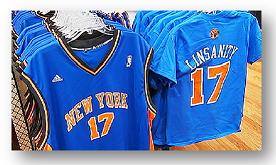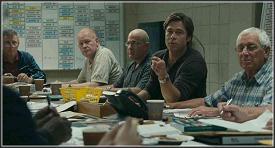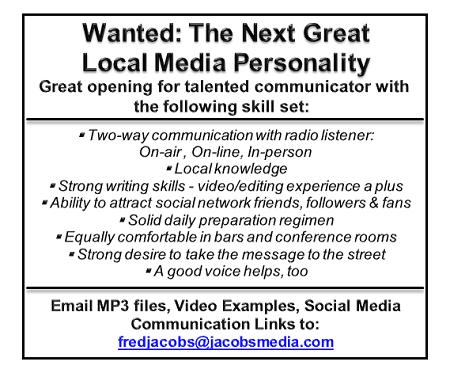In case you’ve somehow missed it, there’s an incredible story sweeping the NBA – and it’s not LeBron or Kobe or bizillion dollar paychecks.
 The new sensation is the unlikely Jeremy Lin. Now lighting it up for the Knicks (and setting NBA records), no one expected Lin to be a pro, much less a star.
The new sensation is the unlikely Jeremy Lin. Now lighting it up for the Knicks (and setting NBA records), no one expected Lin to be a pro, much less a star.
He’s Asian, a Harvard grad, and very religious – not exactly in the NBA mold. Mitch Modell, CEO of the sports merchandising company that bears his name, declares, “I have never, ever seen a player take the city, the state, the country, by storm the way Jeremy has.” That’s why they’re calling it “Linsanity.”
So MediaPost’s Wayne Friedman ponders what programmers can learn from Lin’s surprising success? How did all these well-staffed NBA teams miss this guy? Were they all “Linsane?”
Well, it’s not the first time. Tom Brady had to fight for a starting role while at Michigan, and then was drafted in the 6th round of the 2000 NFL Draft. That means that every team passed him by – multiple times. Yet, most would agree that he may go down as one of the greatest NFL quarterbacks of all time, this year’s Super Bowl notwithstanding. And there are other stories of misreading talent in all sports.
 So what does that tell us about the state of the art talent recruiting and scouting? As Friedman notes, it’s a scene right out of Moneyball, where Oakland A’s GM had to turn the scouting paradigm on its side in order to rethink the way that talent is selected in Major League Baseball.
So what does that tell us about the state of the art talent recruiting and scouting? As Friedman notes, it’s a scene right out of Moneyball, where Oakland A’s GM had to turn the scouting paradigm on its side in order to rethink the way that talent is selected in Major League Baseball.
Some of the greatest scenes in the movie starring Brad Pitt as Billy Beane sitting with his traditional scouts, trying to get them to think differently about what’s important in the talent recruitment process in a game that isn’t the same as it used to be.
The truth is that the same can be said for radio. How many unlikely successes can we think of – jocks that didn’t have great pipes or had only worked in small markets that somehow became stars. Yes, icons like Stern and Dahl come to mind. So do Mark & Brian who moved all the way from Birmingham, Alabama to KLOS – and you know the rest of the story. Or Brother Wease who was the overnight guy at WCMF until he got the chance to do mornings.
And it’s not just morning guys. Jocks like Pierre Robert, Doug Podell, and so many others who don’t have the classic radio voice bring so much more to the table – passion, effort, style, energy, and the ability to touch people’s lives and the communities in which they live.
But you might now know that if you just stayed with tried and true research measurement and evaluation, whether it’s the ratings or focus groups and perceptual studies. As a research guy myself, I have to fight that pragmatic left-brain urge to simply let the numbers make the decisions, because when you’re talking about talent on the field or in the studio, intangibles take over. You have to use that creative “gut” to see past the obvious limitations to imagine the possibilites.
That’s what’s going on with Jeremy Lin, and it leads us to start considering other qualities that come into play when you’re evaluating radio talent in 2012.
What are the characteristics that matter today? What are the skills that can attract and mobilize audiences and communities? What about the ability to make sales and agency calls and handle client events? And how about the ability to dream up and write great Facebook posts, tweets, and texts that stimulate and motivate? Or the street smarts and passion it takes to understand that audience relationships are now one-to-one, and not just about speaking at a large mass of generic cumers.
We need to start evaluating talent differently in our future hires because the game is changing before our eyes and ears. The skill sets that signaled on-air success in the ‘70s and ‘80s have been altered by today’s new needs to communicate, interact, and connect.
 Like the world of sports, our business is loaded with intangibles. And perhaps some of the most unusual and unlikeliest of people could have what it takes to be successful in radio today.
Like the world of sports, our business is loaded with intangibles. And perhaps some of the most unusual and unlikeliest of people could have what it takes to be successful in radio today.
Here’s to Jeremy Lin and other stars who have played against type and bucked the odds to show up the “experts.”
And here’s to having an open mind in searching for the radio stars of the future who break the mold and the occasional piece of china.
- What To Do If Your Radio Station Goes Through A Midlife Crisis - April 25, 2025
- A 2020 Lesson?It Could All Be Gone In A Flash - April 24, 2025
- How AI Can Give Radio Personalities More…PERSONALITY - April 23, 2025




Fred, great post today as always. You do a great job of finding the relevance to radio of whatever is happening. And I particularly love the ad seeking new talent.
I did want to mention, for perspective, the ages of the people you mention in your post (sourced from Wikipedia, but seems correct): Stern is 58, Dahl is 57. Brother Wease is 64, Mark & Brian are 55 and 52, respectively. Pierre Robert is 56, and I can’t find an age on the Internet for Doug Podell. I’ll add for good measure that Rick Dees is 61.
The similarities in their ages brings to mind the book Outliers by Malcolm Gladwell. He points out that Bill Gates, Steve Jobs, Paul Allen, Bill Joy and Scott McNealy were all born within a few years of one another. They are (were) all brilliant, to be sure, but they had the right timing to be born about 18 years before the personal computer era began.
If we assume the radio guys you mention were all about 20 when they were ‘discovered’, that means that period of great talent discovery in radio was in about 1973 or so. These guys certainly are all geniuses of radio, but they clearly benefited from emerging at the right time, I suppose as FM was developing new talent and creating new formats.
And yes, many younger talents abound in the radio industry today. But maybe the bigger challenge is how ‘radio’ can provide growth for people’s careers. After all, the personal computer era begat the Internet era, and the next wave of Bezos, Zuckerberg, Brin & Page, etc. could come along and make their fortune on the shoulders of the first guys. What is Radio’s equivalent? Is it, or could it have been HD? Or is it Internet Radio experimentation led by the old-line Radio conglomerates? Or will it emerge from elsewhere, as Radio offers today’s young talents no pathway to fulfill today’s generation of talents’ creative desires?
Larry, this is a great comment and you have hit on some important points. Right time, right place is a factor. But radio needs great talent now more than ever. And to your point, radio has to show young people a trajectory, a path, an avenue for advancement. Of course, I would love to get more comments on this. Thanks for the time and persepctive.